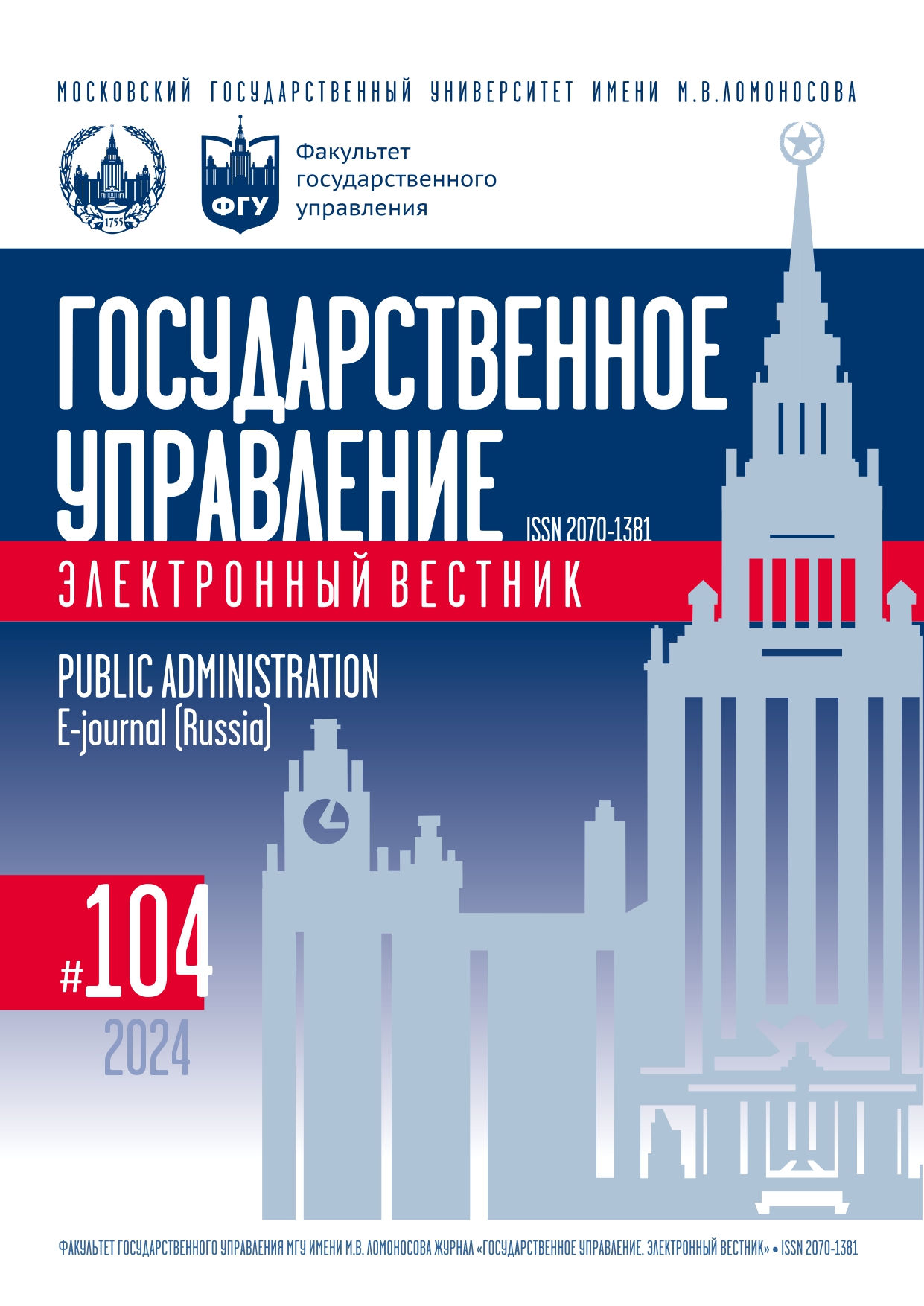Fundamentals of the Strategy of the State National Policy of the Russian Federation and Improving the Conceptual Framework for Regulating Interethnic Relations
DOI:
https://doi.org/10.24412/6bazmq61Keywords:
Concept of State National Policy, Strategy of State National Policy, Russian nation, ethnocultural factor, spiritual and moral values, institutional basis.Abstract
An important aspect of the political history of post-Soviet Russia is the search for and formulation of the doctrinal foundations of state national policy. In this regard, the analysis of conceptual documents related to this area is of great importance. These include the Concept of State National Policy of the Russian Federation, adopted in 1996, and the Strategy of State National Policy of the Russian Federation for the period until 2025, approved in 2012. One of the key concepts in the latest document is the conception of “Russian nation”, meaning a community of all citizens of Russia, regardless of their ethnic origin. It seems important to consider the possible trends of evolution of this document, the adoption of which was an important milestone in the implementation of Russia’s nationality policy. Despite the civil, political and legal nature of the Russian nation, the ethnic Russian cultural core plays an important role in maintaining its unity. This circumstance was noted in the article “Russia: The National Question” (2012) written by V.V. Putin, many of the provisions of which formed the basis of the Strategy. In the future, it seems that the role of the ethnocultural factor in ensuring civil unity will be analyzed in more depth. A deeper study of the issue of the spiritual and moral foundations of a civil nation is also inevitable. The adoption of the Strategy has also become an important incentive for improving the institutional framework of state national policy, the development of which is given a large place in the program document.
References
Андросов М.В. Государственная национальная политика Российской Федерации: от Концепции к Стратегии // Государственно-правовые исследования. 2020. № 4. С. 97–203.
Аршин К.В. Русские как «государствообразующий народ» или «государствообразующий народ» как русские (ответ на статью В.А. Ачкасова «зачем русским статус “государствообразующего народа”?») // Политическая экспертиза: ПОЛИТЭКС. 2023. Т. 19. № 2. С. 333–348. DOI: 10.21638/spbu23.2023.212
Годик М.А. Реализация Стратегии государственной национальной политики Российской Федерации на период до 2025 г.: подходы, процессы, практики // Вопросы национальных и федеративных отношений. 2023. Т. 13. № 6(99). С. 2561–2572. DOI: 10.35775/PSI.2023.99.6.020
Заметина Т.В. Обновленная Стратегия государственной национальной политики Российской Федерации: достоинства и недостатки // Вестник Нижегородской академии МВД России. 2019. № 3(47). С. 10–15. DOI: 10.36511/2078-5356-2019-3-10-15
Зорин В.Ю. Российская этнополитика на современном этапе: традиции и инновации // Вестник Российской нации. 2019. № 2. С. 9–33.
Полунов А.Ю. Научное обеспечение государственной национальной политики в 1990-е – начале 2000-х гг.: концептуальные и институциональные основы // Вестник антропологии. 2021. № 4. С. 7–21. DOI: 10.33876/2311-0546/2021-4/7-21
Попков Ю.В. Государственная национальная политика России: проблемы и концептуальные лакуны // Политическая экспертиза: ПОЛИТЭКС. 2019. Т. 15. № 3. С. 345–366. DOI: 10.21638/11701/spbu23.2019.302
Рыжова С.В. Содержание и динамика этнической идентичности в России // Этническое и религиозное многообразие в России / под ред. В.А. Тишкова, В.В. Степанова. М.: ИЭА РАН, 2018. С. 119–135.
Breslauer G., Dale C. Boris Yel’tsin and the Invention of a Russian Nation-State // Post-Soviet Affairs. 1997. Vol. 13. Is. 4. Р. 303–332. DOI: 10.1080/1060586X.1997.10641441
Goode P. Russia’s Ministry of Ambivalence: The Failure of Civic Nation-Building in Post-Soviet Russia // Post-Soviet Affairs. 2019. Vol. 35. Is. 2. Р. 140–160. DOI: 10.1080/1060586X.2018.1547040
Semenenko I. Ethnicities, Nationalism and the Politics of Identity: Shaping the Nation in Russia // Europe-Asia Studies. 2015. Vol. 67. Is. 2. Р. 306–326. DOI: 10.1080/09668136.2014.1002681
Shevel O. Russian Nation-Building from Yel’tsin to Medvedev: Ethnic, Civic or Purposefully Ambiguous? // Europe-Asia Studies. Vol. 63. Is. 2. Р. 179–202 DOI: 10.1080/09668136.2011.547693
Downloads
Published
Issue
Section
Categories
Similar Articles
- Olga V. Putina, Evolution of the Goals and Objectives of Russia’s State National Policy in the Context of Forming the Strategy of the State National Policy of the Russian Federation for the New Period , Public Administration. E-journal (Russia): No. 113 (2025)
- Varvara A. Sazhina, The Concept of «Russian Nation» and Formation of Civic Identity in the Perception ofthe North Caucasus Youth , Public Administration. E-journal (Russia): No. 97 (2023)
- Vitaly A. Toropchin, Viktoria V. Lazareva, Methodological Aspect of Evaluating the Effectiveness of Public Policy in Depressed Regions , Public Administration. E-journal (Russia): No. 105 (2024)
- Lyubov V. Ulyanova, The System of Social Sciences in the Context of Civilizational Approach: Formulating the Problem , Public Administration. E-journal (Russia): No. 104(S) (2024): The Concept of Russian Civilization: New Trends in Scientific Discussions
- Alexander A. Kurdin, Svyatoslav V. Pikh, Features of Industrial Policy in the Russian Nuclear Industry , Public Administration. E-journal (Russia): No. 84 (2021)
- Tatiana V. Chubarova, Ensuring Access to Healthcare in Russia: Role of Public Policy Instruments , Public Administration. E-journal (Russia): No. 95 (2022)
- Antonina V. Selezneva, Viktotia Ye. Zinenko, Youth Political Leadership in Institutional Dimension: Shaping Environment andDevelopment Features , Public Administration. E-journal (Russia): No. 87 (2021)
- Elena V. Selezneva, Gulzat A. Kenesova, Values of Civil Servants in the Republic of Kazakhstan in Their Representations , Public Administration. E-journal (Russia): No. 90 (2022)
- Ruslan V. Nadtoka, Openness of State Data in the Field of Implementing Priority Directions of National Policy in the Subjects of the Russian Federation , Public Administration. E-journal (Russia): No. 86 (2021)
- Dmitry. А. Vasilyev, State Tariff and Antimonopoly Regulation of the Electric Power Complex: Institutional Aspect , Public Administration. E-journal (Russia): No. 97 (2023)
You may also start an advanced similarity search for this article.




